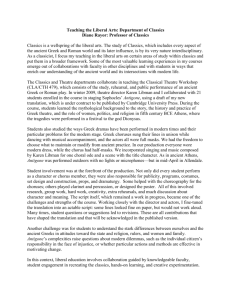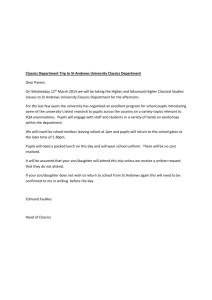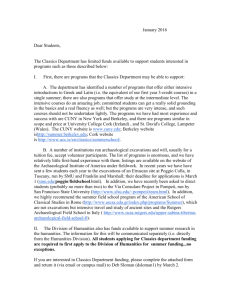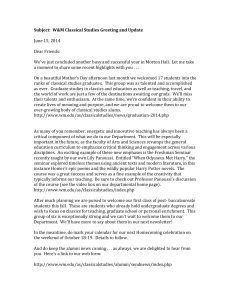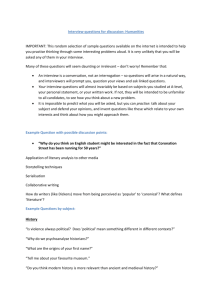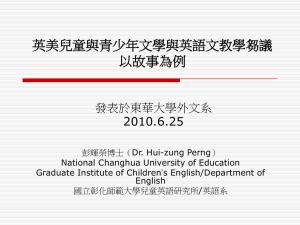Abstract
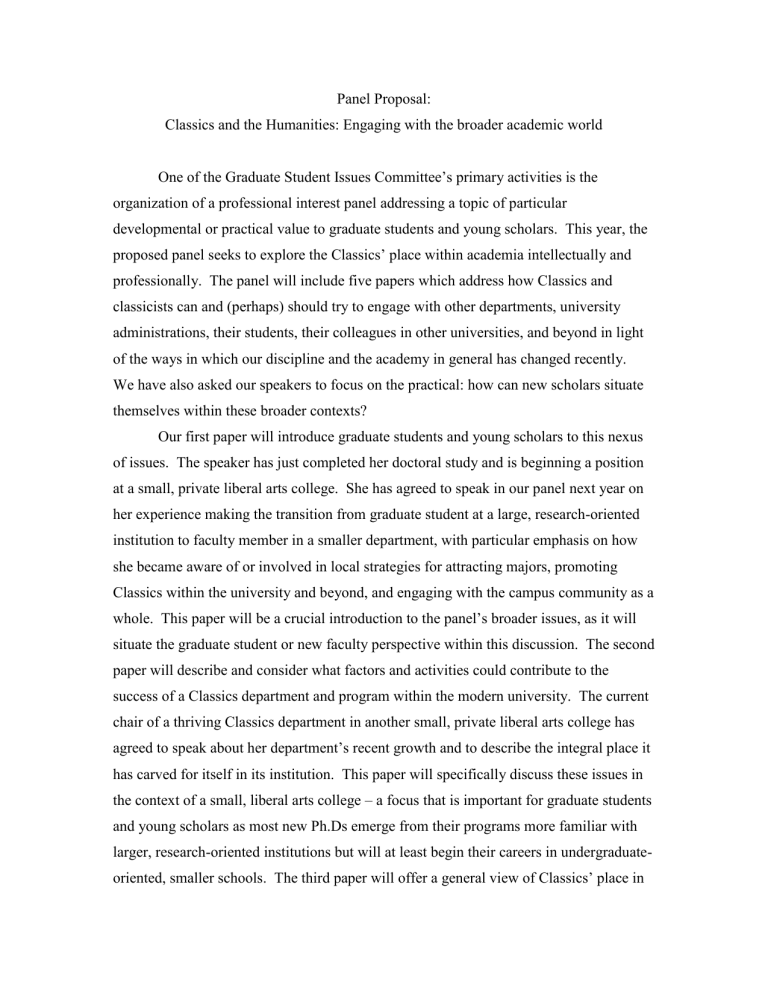
Panel Proposal:
Classics and the Humanities: Engaging with the broader academic world
One of the Graduate Student Issues Committee’s primary activities is the organization of a professional interest panel addressing a topic of particular developmental or practical value to graduate students and young scholars. This year, the proposed panel seeks to explore the Classics’ place within academia intellectually and professionally. The panel will include five papers which address how Classics and classicists can and (perhaps) should try to engage with other departments, university administrations, their students, their colleagues in other universities, and beyond in light of the ways in which our discipline and the academy in general has changed recently.
We have also asked our speakers to focus on the practical: how can new scholars situate themselves within these broader contexts?
Our first paper will introduce graduate students and young scholars to this nexus of issues. The speaker has just completed her doctoral study and is beginning a position at a small, private liberal arts college. She has agreed to speak in our panel next year on her experience making the transition from graduate student at a large, research-oriented institution to faculty member in a smaller department, with particular emphasis on how she became aware of or involved in local strategies for attracting majors, promoting
Classics within the university and beyond, and engaging with the campus community as a whole. This paper will be a crucial introduction to the panel’s broader issues, as it will situate the graduate student or new faculty perspective within this discussion. The second paper will describe and consider what factors and activities could contribute to the success of a Classics department and program within the modern university. The current chair of a thriving Classics department in another small, private liberal arts college has agreed to speak about her department’s recent growth and to describe the integral place it has carved for itself in its institution. This paper will specifically discuss these issues in the context of a small, liberal arts college – a focus that is important for graduate students and young scholars as most new Ph.Ds emerge from their programs more familiar with larger, research-oriented institutions but will at least begin their careers in undergraduateoriented, smaller schools. The third paper will offer a general view of Classics’ place in
the changing world of academic institutions, from a speaker with extensive recent experience working with academic administrations. This paper, entitled “Keeping
Classics Safe”, will introduce some emerging threats to Classical Studies and present some ideas for strategies for survival. This paper will be especially valuable for the insights it will provide into what administrations may be looking for from academics and their departments in the future. The fourth paper will continue this discussion, but focus especially on the place of Greek and Latin within more general language pedagogies.
Greek and Latin present an opportunity to forge connections between Classical Studies and other departments within the university, and this paper’s emphasis on “intentionality” will emphasize the ways in which classical scholars might take advantage of these opportunities. This paper will also consider the extent to which institutional language requirements might allow Classics departments to create space for themselves in university communities. The fifth and final paper will provide a summary discussion on the perspectives offered in the earlier papers, and consider the broader place of the humanities – not just Classics – within the university today. It will consider the possibilities that collaboration within the humanities can offer to departments seeking security and the promotion of the Classics.
This panel will offer a stimulating discussion of several interrelated aspects of
Classics’ place within the intellectual and administrative world of the university, and many of the papers seek to offer ideas for how new scholars might best find a place for themselves within this world. In this way, it will be of both professional and practical interest to current graduate students and new faculty.
Panel Proposal: Classics in the University
Making the Transition: Reflections of a First Year Professor
Paper One
This abstract will be, necessarily, somewhat speculative, since I have been asked to speak largely on the basis of the position I will hold in the coming academic year.
Starting in September 2010, I will be teaching at Kalamazoo College as a one-year postdoc. This will be my first faculty position after finishing my PhD at the University of
Michigan, and for this panel I will discuss my experiences in transitioning from graduate student to faculty, and in working in two very different departments and schools.
I plan to discuss the job market, and in particular, interviewing at a small school. I found the campus visit I had at Kalamazoo last spring to be surprising in several ways, including the speed of the process, the interest they had in the fact that I had gone to a small liberal arts college as an undergraduate, and the class (rather outside of my expertise) for which I gave a guest lecture. I will be interested to see how the process is different during my job search this year, with a year of teaching experience as faculty but without my graduate department’s placement service to smooth the process. Beyond the job market, I expect to discuss my experiences in the coming year with trying to balance research and teaching; incorporating research into my teaching (I will be teaching a class on ancient religions this fall, which is, broadly, where my research interests lie); interacting with undergraduate classics clubs and other student groups, and with members of other departments; and the rather different academic and social obligations and opportunities which come with being part of a smaller department.
Panel Proposal: Classics in the University
Classics at a Liberal Arts College
Paper Two
I serve as chair of a thriving Classics department at a liberal arts college, and I have taught there for thirteen years. I propose to reflect on the reasons why our department is successful within our environment, and close with thoughts for new faculty in Classics at undergraduate institutions.
After briefly reviewing the educational genre of “Liberal Arts College,” I will describe the place of my institution within that universe. Important features which affect our success include a strong focus on internationalism, social and political engagement, and current events. I suggest that we thrive within this context due to our particular definition of Classics, and our focus on our students as liberal arts undergraduates first and Classicists second.
We create as broad an understanding of Classics as possible, geographically, temporally and disciplinarily. Our courses traverse the ancient Mediterranean and Near
East, from 1500 BCE to the film Gladiator, with major tracks in archaeology, civilization and languages. Since four full time faculty cannot cover that, we cross list any course anywhere that might be pertinent. Our students’ major plans include courses from
Anthropology, Religion, History, English, Urban Studies, Geology, Art, Art History,
Humanities & Cultural Studies and Women’s & Gender Studies, and those departments utilize our courses. We aim to make connections rather than mark territory, and we have thereby become integral to the College curriculum. We also work to develop personal connections to enhance these technical ones. Such ties communicate to students, faculty, and the administration that Classics is everywhere and fundamental.
Our attitude toward the field and how one works within it is also quite international. We require study away for all majors. Most of us have done research abroad, and we offer our own programs for students, including January in Rome, in
Turkey, and a summer excavation of a Roman temple in northern Israel. Students and faculty create camaraderie traveling and working together, and you see again the geographic breadth of our program. The administration also loves these programs, since semester study away is expensive.
Recently the administration asked us to create a program in Arabic. I see this as evidence for the general regard in which we are held on campus, how well the breadth of our study of the ancient world is understood, and also how successful we are with our language programs in Greek, Latin and Hebrew. Our effort to embrace the study of the
Near East has also had important effects in the wake of 9/11 and the wars in Afghanistan and Iraq. In our study of classical antiquity we work to loosen the rigidity of the modern construction of East and West and encourage students to see those within a broader historical context. In a way important for our campus, Classics speaks to contemporary issues by challenging the usefulness of an exclusively modernist approach.
As for students, we do not consider the major a pre-professional program. The tracks are not designed to prep students for graduate school, and we advise those interested in continuing that more work is necessary. Our goal is the broad one of the liberal arts -- intellectual agility, critical and creative thinking, and a range of skills, experiences, and approaches. We emphasize language acquisition, the value of multiple disciplines, independent research, and a breadth of historical and cultural knowledge.
This matches our majors’ life goals well. They have great success in applying to law school, medical school, positions in governmental, corporate and non-profit work, as well as graduate programs in Archaeology, Art History, Middle Eastern Studies, Museum
Studies, Religion, History, and English, as well as Classics. The breadth of our definition of the field and our encouragement that they shape majors that fit their goals draw students from many parts of campus.
By no means do I advocate these approaches as the path for a successful Classics department. These are simply well suited to the institution of which we are a part.
Classics is a powerful and flexible field, and can be adapted to fit a local institutional culture. How can your department be of use? Become indispensible?
I conclude with a few thoughts for those just joining departments. One question is the same one I pose to departments: do you want to operate on a competitive or cooperative model? Even if you are competitive by nature, who is your competition?
Colleagues within the department? Outside of the department? Scholars your age at other institutions? Whatever the answer, new professors should consider this carefully as they begin to establish their place within an institution, develop their sense of themselves as
professors, and present that self to others. Finally, knowing something of the local institutional culture can help the individual as well as the department thrive.
Panel Proposal: Classics in the University
Keeping Classics Safe
Paper Three
Institutional change tends to begin from the outside in (and usually never reaches very far once begun). The place one does not want to be at such times is on the fringe, but that is where, given limited enrolments and limited staff, Classics departments tend to be—no one is going to shut down or aggregate the English Department to another.
Classics Departments, however, may often find themselves linked to larger entities
(modern language departments for instance) where they are threatened with marginality and able to mount only partial programs. How might Classicists think proactively to maintain a distinctive place within the humanities?
There is no one answer to the question of securing classics, and departments that seek a single solution may find themselves in difficulty. The old panacea of teaching a few large enrolment courses in translation is no longer good enough—everybody does it and many people, frankly, do it with material that students find less challenging. Courses in translation must be part of a Classical Civilization curriculum that can be presented to the administration as having intellectual coherence in its own right (e.g. our courses teach people how to read closely and to write better). We must also be aware that many in the humanities tend to think of a field that deals with dead people as being somehow less active than their own. It behooves classicists to enable people to know how our field is changed on a regular basis by discoveries of previously unknown texts and excavation.
Most places these days put a premium on enhanced teaching, and campus-wide discussions of teaching can be extremely useful—it is an interdisciplinary activity that we can and must be part of. If your department does not have a subscription to the Chronicle of Higher Education , you should get one since that will help you situate your interests within the broader educational community.
Collegiality is very important, not just at the College level, but also within the program. Not everyone is going to love their colleagues, sometimes hires do not work out that way that one hoped, and every department is likely to go through rough patches, but it behooves us to realize that if we appear disorganized and quarrelsome, we not in a
good position to ask for support. It is important to find areas where agreement is possible.
Many members of our profession have undertaken administrative tasks at college and university levels. This is extremely important and can take many forms, even if not to the tastes of everyone. One does not need to be a Dean to be engaged. Classicists need to be willing to serve on collegiate and university committees. These are activities of greater and lesser relevance depending upon the nature of an institution but they will inevitably facilitate contact with the administration outside the usual cycle of appointments and budgets. It also tends to facilitate contact with the administration around topics that the administration regards as important and to see how members of our profession can make useful contributions to issues that are regarded as being of general campus interest such as study abroad programs, the university budget, health care policy, the experience of students who are on the fringes of the community and so forth.
Finally there is the issue of scholarly productivity. If we are not productive we are more vulnerable, and we must be productive on a department-wide basis. For all that administrations like to see devotion to teaching they like to see that devotion accompanied by an ever expanding list of publications.
In the current climate of retrenchment and accountability we need to realize that if we are seen to be on the fringes, contraction is pretty much the order of the day. But it need not be that way, and to some degree we have been here before. John Pedley is publishing a fascinating study of Francis Kelsey, the extraordinarily entrepreneurial creator of the Department of Classical Studies at Michigan. It is a study of massive engagement within the university community and the profession as a whole—of Kelsey’s work establishing the University’s press, epigraphic and papyrological collections, its presence in archaeology and the continued significance of its traditional teaching programs. What Kelsey saw in 1900 is true as well in 2011, that a as universities change we must be willing to be part of the process. There is no single recipe for success—as
Symmachus wrote so long ago, as in a time of change, uno itinere non potest perviniri ad tam grande secretum . He may have lost that particular fight, but the principal remains important—one can progress with a single model. In this case the paths to success involve curricular reform, community engagement, productivity and collegiality.
Panel Proposal: Classics in the University
Being Intentional about Language Teaching:
Forging Connections with World Languages
Paper Four
It is easy to overlook or take for granted the connection that Classical Studies has with other world languages. Ever since I arrived at my home institution, I have been located within the Department of Classical and Modern Languages and that fact has had repercussions for how I see the world and how I interact with my colleagues. They share our passion for language teaching, our love of literature and culture, and our commitment to create global citizens. As a result, they should be our closest allies. In this paper, I will discuss the importance of being intentional in creating commonalities with modern languages, in developing assessment plans that address all languages at an institution, and in formulating larger institutional statements about language learning, in particular, the language requirement. Throughout the presentation, I will link the situation on the ground at my home institution with larger trends within language pedagogy, second language acquisition, and post-secondary education in general.
In creating commonalities, the very first task that Classicists have is to reiterate that Latin and Greek are similar to other world languages. Frequently, there is the misperception that since Latin and Greek are ancient languages, there is no need to speak them. Yet it is well-known that learning to read requires a period of subvocalization in which language learners match sounds with the symbols that represent letters, syllables, words, and phrases. In addition, asking students to speak and listen to the sounds and patterns of Latin and Greek help them hear the regular patterns of word order and syntax in the ancient languages. Finally, the more we offer students multiple ways of approaching and learning the language, the more we offer opportunities for students with different learning styles access to Latin and Greek. Thus, the first step in the process is to show how Classicists can respond to research in second language learning and integrate more spoken language as a core portion of their language classes.
A second area of common interest is the assessment of our language programs. While
Classicists are unlikely to make the Oral Proficiency Interview (OPI) a centerpiece of our assessment efforts, we do share many other goals in language teaching. For example, the
ACTFL Standards for Foreign Language Teaching make clear that communication involves interpretation and presentation, as well as interpersonal interaction. Such a paradigm creates space for Classicists who emphasize reading and writing Latin and
Greek. Moreover, the trend in language pedagogy is to emphasize the importance of literacy and reading as one of the most effective ways to achieve progress in second language acquisition (Kern; Scott). Additionally, culture has become recognized as the equal of language and communication skills since language can only take place within cultural and social contexts (Kramsch; Lantolf; MLA Report). As we assess our programs, our attention to language, literacy, and culture will help us develop commonalities among languages and create a united front within the institution.
Finally, as programs like Drake University and George Washington University have dropped or changed language requirements, it is important that Classicists lead the way in making sure that language study continues to play a large role in the undergraduate curriculum while still responding to national trends that emphasize global citizenship at the expense of language study. In this last section I will detail the compromises and revision of our language program to make culture a stronger component of our curriculum while attempting to maintain a strong language component as part of the core curriculum.
Panel Proposal: Classics in the University
Classics in the University
Paper Five
Adding to the pressures of preparing for the job market in Classics is the protean nature of the discipline within the university or college. When applying for a job, it is important to understand what Classics means and where it sits within a particular institution— this will affect not only the sort of application letter you write, but, more significantly, the shape of your career after you land the job. In the first part of this talk, we will look at several examples of institutional configurations of Classics and Classical
Studies and consider what the ramifications of these configurations are for curriculum and for faculty. The second part of the talk will take a look at the larger picture— the situation of the humanities in the university today, and ways that Classics programs can work collaboratively to strengthen the humanities within their institutions and to build meaningful public humanities initiatives in their communities.
